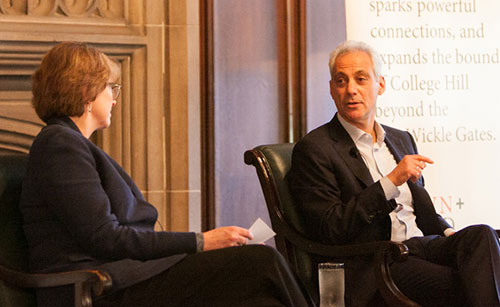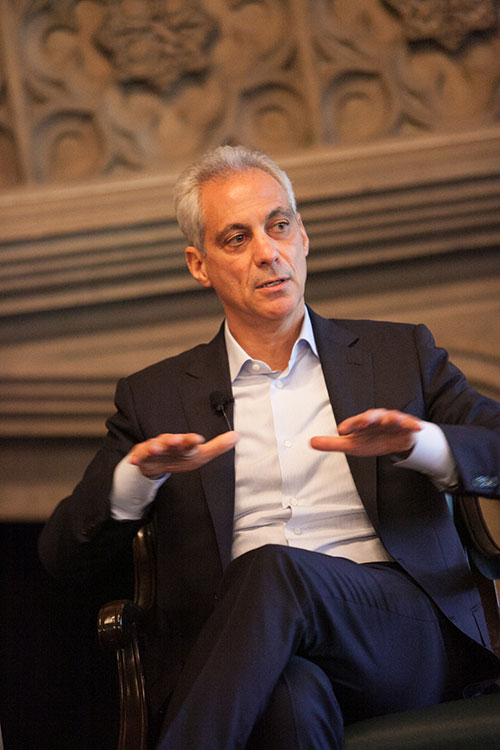
CHICAGO [Brown University] — A few years ago, Chicago Mayor Rahm Emanuel enacted a program he says gives him as much pride as any he's worked on in his public life.
Under his Chicago Star Scholars program, all students who graduate from the city's public high schools with a grade point average of 3.0 or higher get free tuition at any of Chicago's community colleges. If they maintain that GPA in community college, they're eligible for tuition discounts of 20 to 50 percent one of Chicago's 17 four-year colleges and universities.
"A young man came up to me [recently] and said, 'I want to thank you,'" Emanuel said. "He told me, 'I'm a Chicago Star scholar, I'm graduating this year from DePaul. I have zero debt and I have a job... paying $150,000 a year in computer science.'"
That moment made the trials and tribulations of being a big city mayor worthwhile, Emanuel said. "That's why you do this." The program reflects the need to emphasize education as a driver for economic opportunity and prosperity, Emanuel noted.
On Wednesday, May 2, he shared that perspective and more during a "fireside chat" with Brown President Christina Paxson, hosted by Brown Chancellor Samuel Mencoff at the University Club of Chicago.
An audience of approximately 180 was on hand for the hour-long chat, part of a series of events that aims to bring insights from members of the extended Brown community to alumni, parents and others to build community and create lifelong learning opportunities.
The Star Scholars program addresses what Paxson sees as one of the most critical areas of educational innovation: providing access to education regardless of a student's ability to pay.
"If we want to expand educational opportunity, we have to be innovative in the ways we get under-resourced kids through high school, into higher education and then into the labor market," Paxson said during the event. "And Brown is doing that in a number of ways."
She cited programs like The Brown Promise, which is replacing loans with scholarship dollars from all Brown financial aid packages, and the University's First Generation and Low-Income Student Center, which provides critical support for students throughout their college careers.
Emanuel said his commitment to higher education grew in part out of his time working as chief of staff for President Barack Obama. During the height of the recession following the 2008 financial crisis, unemployment soared nationwide, but one demographic seemed to have been spared.
"At the worst moment of the recession, when unemployment was hitting 11 percent, what do you think the unemployment rate was for a person with a four-year degree?" Emanuel asked. "It was 4.6. When the world was coming apart, if you had a college degree, you had the insurance policy you needed."
That's why as mayor Emanuel sees it as his responsibility to make sure that Chicago's students succeed beyond high school. To that end, he's introduced a proposal - "Learn. Plan. Succeed." - that would require all high school students to have a plan for some sort of continuing education in order to get their diplomas.

"I have to make sure that my responsibility does not end the day students get their diploma," Emanuel said. "Mayors are going to find out that they're going to have to have a plan for those kids after high school."
Another priority is improving the pipeline into college by supporting education at all levels. As mayor, Emanuel lengthened the school day and school year in the Chicago Public Schools, giving students the equivalent of 2.5 additional years of education of the course of their school careers.
"When I came in, Chicago had the shortest school day and the shortest school year in the United States, and 84 percent of our kids are at the poverty line or below," Emanuel said. "I just thought if you're trying to break the cycle of poverty and you had a blank piece of paper, wouldn't you start [by fixing] the shortest school day and the shortest school year?"
Another of Emanuel's education initiatives involves expanding partnerships between industry and Chicago Public Schools. It's something that hits close to home for Paxson. Her father-in-law grew up in Chicago and attended Crane Technical High School on the city's west side, she told the audience. The school had faltered in recent years and in 2011 found itself on a list of schools to be closed.
But rather than shutter it, Emanuel formed a coalition of nearby health care providers to reinvent the school. It was reborn as Crane Medical Preparatory High School. Since then, tests scores have improved, graduation rates are up, and the school is off the chopping block.
The idea of partnership in education is something that Paxson sees as key to both improving education and for enabling education to improve communities.
"At Brown, we're doing a lot [of partnering]," she said. "We're engaging through the Nelson Center for Entrepreneurship with startups around Providence. We have industry partners working with the medical school and our newly named Carney Institute for Brain Science, as well as with engineering and computer science. And we have community organizations, government agencies and schools working with Brown through the Swearer Center."
She also cited Brown partnerships that are helping to revitalize Providence's Jewelry District - projects like South Street Landing and the city's in-progress Innovation Center, two major public-private developments where Brown serves as a major tenant.
"We're doing a lot to partner with Providence, to develop in Providence and to attract business to Providence," she said. "Because we know that Providence's success is our success and vice versa."
Emanuel too sees colleges and universities as key to his city's prosperity and says they're irreplaceable in luring new companies to town. He said tax breaks, economic aid and other incentives cities offer to lure companies are part of the picture, but what really matters is being able to provide the people that companies need to be successful.
"You want a Booth or Kellogg [business school] graduate? We've got that," Emanuel said. "You want an accountant out of the University of Illinois? Got that. You want a computer scientist out of IIT [Illinois Institute of Technology] or Purdue? Got that. You want an operations or IT support person out of Wright Community College? Got that. We can give you absolute labor certainty for the next 40 years."
That full suite of ready labor is a much greater draw than any tax break a government could provide, he said. But Paxson had an idea for making it even better.
"We'll try to send you more Brown students - how about that?" she said.
"Game," Emanuel responded. "I'm in."